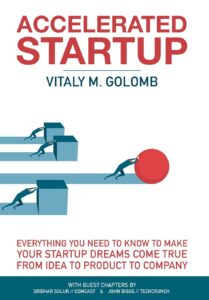This article was originally posted by USV grad Vitaly Golomb, a venture capitalist, serial entrepreneur, keynote speaker and author who has been involved with startups since his teenage years. He leads global investments at HP Tech Ventures, the corporate venture arm of Silicon Valley’s original startup. He is a contributing writer to TechCrunch and a consistently top-ranked mentor at a number of startup accelerator programs in the US, Europe, and Asia. He lives in the San Francisco Bay Area and travels to over 20 countries annually to consult and guest lecture to corporations, associations, and universities on entrepreneurship, innovation and design.

Since 1971, heads of state and industry have been gathering for five cold, January days in the Swiss mountain town of Davos for the World Economic Forum. The event has provided a powerful platform for discussing anything from trade deals to economic policy to challenges affecting the entire planet. For the past few years, a bustling community of “unDavos” has also blossomed alongside the official event. It attracts tech leaders and investors to mingle with the officially invited attendees. While the official event hosts approximately 3,000 delegates, unDavos has swollen to several times that. The days are filled with fascinating, intimate panels, while the parties go to odd hours of the morning. It is a pricey experience, both in your wallet because of the hotel (aka ski cabin) prices and on your health because of the demanding 18-hour days spent socializing. Most will tell you, however, that it is well worth it. A number groups and companies host their own expos to grab attention from the world’s biggest movers and shakers. This year Facebook, Salesforce, and Tradeshift, among others exhibited alongside government and private organizations promoting economic development in India, Hong Kong, Russia, Ukraine and more. I joined in support of the first Ukrainian House and sat-in on a venture capital panel. So with that context, I was expecting to come to an economic development and innovation event but somehow ended up in the middle of a Crypto conference. Every single panel and every single speaker mentioned Crypto and/or Blockchain. It is as if Artificial Intelligence, Augmented Reality, 3D Printing, and breakthroughs in biotech are old news. Crypto has gotten a Trump-sized amount of media coverage since mid-2017 due to the meteoric rise of the value in cryptocurrencies but ironically they are being used as anything but “currencies.” As a quick premise for the uninitiated: there are hundreds of tokens being floated through an Initial Coin Offering (or ICO) process which is essentially a mini-IPO. Also, most of these tokens are not shares in the companies but more like Kickstarter-on-steroid credits for their various future services. Goes without saying that this is a very polarizing phenomenon where the world is divided into true believers who think blockchain will change everything under the sun and those who think it is a complete scam.

I fall somewhere in the middle — though as a venture practitioner and entrepreneur, I’m an irrational optimist by nature. Having read numerous white papers–which are something in between a Ph.D. thesis and seed stage startup executive summary–my expectation is that 98% will go to zero. This is not at all out of the ordinary for a 1st generation wave of companies in a new industry. Think back to the dotcom days, if you were around then. What’s worrying, however, is the number of amateur investors jumping in thinking they are nearly guaranteed to get rich. This is far from the actual odds and they will get burned when inevitably this initial cohort of companies fails to produce anything viable. Hopefully, the good, fundamental projects don’t become collateral damage and prolong the trough until the resurgence. The Gartner Hype Cycle very much applies. Here are the most insightful bits I’ve learned from talking to blockchain leaders in Davos non-stop for a week:
- It’s been 10 years and blockchain transactions are shrinking (lately) not growing… because people are just speculating on tokens regardless of their specific intent. Even if you wanted to “use” them, very few blockchains are commercial-ready services.
- KodakCoin (that tripped Kodak’s stock price when announced in January) is a project by a 3rd party that simply bought a brand license from Kodak. It is also highly criticized by those who have analyzed the technology. I didn’t learn this at Davos but it was a popular topic of LOLz.
- The success of an ICO is far more determined by the quality of the marketing effort than the underlying business proposition or technology. Sad but true, the biggest ICO successes come from affiliate marketers who know how to drive traffic more than anything else.
- On the same token, don’t expect in-depth business model explanations. Shockingly, I’ve talked to co-founders of successful $50M+ ICOs who can’t explain even the basics of their business model. Two years ago they wouldn’t be able to get into a 3rd tier accelerator; today they are buying lambos. If the bar is truly this low, there will be a lot of tears soon.
- Blockchain teams run very young and inexperienced when compared to their conventional startup counterparts. Pair this with the lack of professional investors with skin in the game overseeing company governance and this has already led to a number of ethics and operational blow-ups.
- Having crossed over into a substantial-sized industry, ICOs are increasingly trending towards private sales to professional investor rounds and staying away from public sales which have caused so many regulatory headaches.
- Not much talked about yet, but asset-backed ICOs will effectively allow for the creation of whole new securities. You might buy your next time-share on Coinbase and not from some cheesy sales guy in a Hawaiian t-shirt. Or you might be watching a classic car or art auction on TV and buy a share of that portfolio as an investment. Watch this space.
- Regulators are starting to apply pressure and issue opinions that if it walks like an equity and quacks like an equity, it’s an equity. Regardless of the crafty wordsmithing and legal slaloms (yey Olympics) regulators have signaled very serious intent. It is likely just a matter of time before an example is made and someone is sent to jail for securities violations or fraud.
- Big ICOs raise tens or hundreds of millions of dollars. Few of these companies (who I’ve talked to so far, at least) know the first thing about managing their treasury, currency risk, or diversifying their portfolio. They simply sell some of the Bitcoin or Ether every month to pay the bills. Just ad hoc. Lots of room for professional accounting services here and I’m fully expecting CFO firms to step into the fray much like big law firms already have.
- The conventional venture fund model doesn’t work with blockchain. 3–5X faster value creation cycle — perhaps because of the current hype-driven euphoria. Most are simply buying coins at a discount pre-ICO and liquidating as soon as they float to the public. This is much closer to the hedge fund than the VC approach. Few are buying and holding for the long-term. Few have an understanding if buying equity in these companies even makes sense. After all, if everything works out, they won’t need to go public. Rather at best, they’ll end up paying a dividend. So does this mean that NASDAQ’s days are numbered? Just too early to tell.
So, no one is completely clear on where we are headed but everyone is excited. This might be the next Internet boom or just a Beanie Baby craze. Proceed with caution. Oh and none of this was investment advice. 🙂


